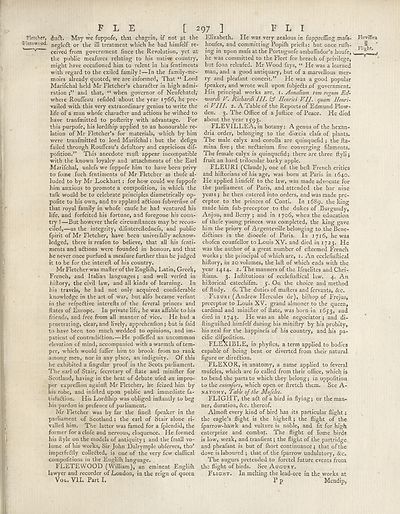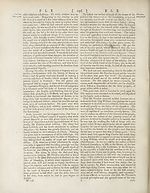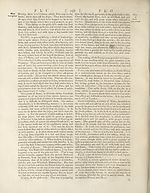Encyclopaedia Britannica > Volume 7, ETM-GOA
(323) Page 297
Download files
Complete book:
Individual page:
Thumbnail gallery: Grid view | List view

F L E [ 297 3 F L I
Tlctclier, duft. May we fuppofe, that chagrin, if not pt the Elizabeth. He was very zealous in fupprefiing mafs- Hevillea
■Iktewood- negle£3; or the ill treatment which he had himfelf re- houfes, and committing Popifh priells: but once ruih-
*'■ v ceived from government fince the Revolution, yet at ing in upon mafs at the Portuguefe ambaflador’s houfe,. ‘f * ‘
the public meafures relating to his native country, he was committed to the Fleet for breach of privilege, J
might have occafioned him to relent in his fentiments but foon releafed. Mr Wood fays, “ He was a learned
with regard to the exiled family !—In the family-me- man, and a good antiquary, but of a marvellous mer-
moirs already quoted, we are informed. That “ Lord ry and pleafant conceit.” He was a good popular
Marifchal held Mr Fletcher’s charafter in high admi- fpeaker, and wrote well upon fubjefts pf government,
ration and that, “ when governor of Neufchatel,’ His principal works are, 1. Annalium tarn regum Ed-
where Rouffeau refided about the year 1766, he pre- ivardi V. Rlchardi III. iff Henrici VII. quam Henri-
vailed with this very extraordinary genius to write the ci VIII. 2. A Table of the Reports of Edmund Plow-
life of a man whofe charafter and aftions he wiftied to den. 3. The Office of a Juftice of Peace. He died
have tranfmitted to pofterity with advantage. For about the year 1593.
this purpofe, his lordfhip applied to an honourable re- FLEVILLEA, in botany: A genus of the hexan-
lation of Mr Fletcher’s for materials, which by him dria order, belonging to the dioecia clafs of plants,
were tranfmitted to lord Marifchal: but the defign The male calyx and corolla are quinquefid ; the fta-
failed through Roufleau’s defultory and capricious dif- mina five ; the neftarium five converging filaments,
pofition.” This anecdote mull appear incompatible The female calyx is quinquefid; there are three ftyli;
with the known loyalty and attachments of the Earl fruit an hard trilocular barky apple.
Marifchal, unlefs we fuppofe him to have been privy FLEURI (Claude), one of the beft French critics
to fome fuch fentiments of Mr Fletcher as thofe al- and hiftorians of his age, was born at Paris in 1640.
luded to by Mr Lockhart: for how could we fuppofe He applied himfelf to the law, was made advocate for
him anxious to promote a compofition, in which the the parliament of Paris, and attended the bar nine
talk would be to celebrate principles diametrically op- years ; he then entered into orders, and was made pre-
pofite to his own, and to applaud a&ions fubverfive of ceptor to the princes of Conti. In 1689, the king
that royal family in whofe caufe he had ventured his made him fub-preceptor to the dukes of Burgundy,
life, and forfeited his fortune, and foregone his conn- Anjou, and Berry ; and in 1706, when the education
try !—But however thefe circumltances may be recon- of thefe young princes was completed, the king gave
ciled,—as the integrity, difintereftednefs, and public him the priory of Argenteville belonging to the Bene-
fpirit of Mr Fletcher, have been univerfally acknow- di&ines in the diocefe of Paris. In 17x6, he was
ledged, there is reafon to believe, that all his fenti- chofen counfellor to Louis XV. and died in 1723. He
merits and adtions were founded in honour, and that was the author of a great number of efteemed French
he never once purfued a meafure further than he judged works ; the principal of which are, 1. An ecclefiallical
it to be for the intereft of his country. hiftory, in 20 volumes, the laft of which ends with the
Mr Fletcher was mailer of theEnglilh, Latin, Greek, year 1414. 2. The manners of the Ifraelites and Chri-
Frcnch, and Italian languages; and well verfed in ttians. 3. Intlitutions of ecclefiaftical law. 4. An
hiftory, the civil law, and all kinds of learning. In hiftorical catechifm. 5. On the choice and method
his travels, he had not only acquired confiderable of ftudy. 6. The duties of mailers and fervants, &c.
knowledge in the art of war, but alfo became verfant Fleurx (Andrew Hercules de), bilhop of Frejus*
in the refpedlive interefts of the feveral princes and preceptor to Louis XV. grand almoner to the queen.
Hates of Europe. In private life, he was affable to his cardinal and minifter of Hate, was born in 1653, and
friends, and free from all manner of vice. He had a died in 1743. was an able negociator ; and di-
penetrating, clear, and lively, apprehenfion; but is faid ftinguilhed himfelf during his miniftry by his probity,
to have been too much wedded to opinions, and im- his zeal for the happinefs of his country, and his pa-
patient of contradidfion.—He poffeffed an uncommon cific difpofition.
elevation of mind, accompanied with a warmth of tern- FLEXIBLE, in phyfics, a term applied to bodies
per, which would fuffer him to brook from no rank capable of being bent or diverted from their natural
among men, nor in any place, an indignity. Of this figure or diredlion.
he exhibited a Angular proof in the Scots parliament. FLEXOR, in anatomy, a name applied to feveral
The earl of Stair, fecretary of Hate and minifter for mufcles, which are fo called from their office, which is
.Scotland, having in the heat of debate ufed an impro- to bend the parts to which they belong; in oppofition
per expreffion againft Mr Fletcher, he feized him by to the extenfors, which open or ftretch them. See A-
his robe, and infifted upon public and immediate fa- natomy, Table of the Mufcles.
tisfadtion. His Lordftiip was obliged inftantly to beg FLIGHT, the adl of a bird in flying; or theman-
his pardon in prefence of parliament. ner, duration, &c. thereof.
Mr Fletcher was by far the fineft fpeaker in the Almoft every kind of bird has its particular flight;
parliament of Scotland: the earl of Stair alone ri- the eagle’s flight is the higheft ; the flight of the
vailed him. The latter was famed for a fplendid, the fparrow-hawk and vulture is noble, and fit for high
former for a clofe and nervous, eloquence. He formed enterprize and combat. The flight of Tome birds
his ftyle on the models of antiquity; and the fmall vo- is low, weak, and tranfient; the flight of the partridge
' lume of his works, Sir John Dalrymple obferves, tho’ and pheafant is but of ftrort continuance; that of the
imperfedtly collected, is one of the very few claffical dove is laboured ; that of the fparrow undulatory, &c.
compofitions in the Englifh language. The augurs pretended to foretel future events from
FLETEWOOD (William), an eminent Englith the flight of birds. See Augury.
lawyer and recorder of London, in the reign of queen Flight. In melting the lead-ore in the works at
Vot. V1L Part I. P p Mendip,
Tlctclier, duft. May we fuppofe, that chagrin, if not pt the Elizabeth. He was very zealous in fupprefiing mafs- Hevillea
■Iktewood- negle£3; or the ill treatment which he had himfelf re- houfes, and committing Popifh priells: but once ruih-
*'■ v ceived from government fince the Revolution, yet at ing in upon mafs at the Portuguefe ambaflador’s houfe,. ‘f * ‘
the public meafures relating to his native country, he was committed to the Fleet for breach of privilege, J
might have occafioned him to relent in his fentiments but foon releafed. Mr Wood fays, “ He was a learned
with regard to the exiled family !—In the family-me- man, and a good antiquary, but of a marvellous mer-
moirs already quoted, we are informed. That “ Lord ry and pleafant conceit.” He was a good popular
Marifchal held Mr Fletcher’s charafter in high admi- fpeaker, and wrote well upon fubjefts pf government,
ration and that, “ when governor of Neufchatel,’ His principal works are, 1. Annalium tarn regum Ed-
where Rouffeau refided about the year 1766, he pre- ivardi V. Rlchardi III. iff Henrici VII. quam Henri-
vailed with this very extraordinary genius to write the ci VIII. 2. A Table of the Reports of Edmund Plow-
life of a man whofe charafter and aftions he wiftied to den. 3. The Office of a Juftice of Peace. He died
have tranfmitted to pofterity with advantage. For about the year 1593.
this purpofe, his lordfhip applied to an honourable re- FLEVILLEA, in botany: A genus of the hexan-
lation of Mr Fletcher’s for materials, which by him dria order, belonging to the dioecia clafs of plants,
were tranfmitted to lord Marifchal: but the defign The male calyx and corolla are quinquefid ; the fta-
failed through Roufleau’s defultory and capricious dif- mina five ; the neftarium five converging filaments,
pofition.” This anecdote mull appear incompatible The female calyx is quinquefid; there are three ftyli;
with the known loyalty and attachments of the Earl fruit an hard trilocular barky apple.
Marifchal, unlefs we fuppofe him to have been privy FLEURI (Claude), one of the beft French critics
to fome fuch fentiments of Mr Fletcher as thofe al- and hiftorians of his age, was born at Paris in 1640.
luded to by Mr Lockhart: for how could we fuppofe He applied himfelf to the law, was made advocate for
him anxious to promote a compofition, in which the the parliament of Paris, and attended the bar nine
talk would be to celebrate principles diametrically op- years ; he then entered into orders, and was made pre-
pofite to his own, and to applaud a&ions fubverfive of ceptor to the princes of Conti. In 1689, the king
that royal family in whofe caufe he had ventured his made him fub-preceptor to the dukes of Burgundy,
life, and forfeited his fortune, and foregone his conn- Anjou, and Berry ; and in 1706, when the education
try !—But however thefe circumltances may be recon- of thefe young princes was completed, the king gave
ciled,—as the integrity, difintereftednefs, and public him the priory of Argenteville belonging to the Bene-
fpirit of Mr Fletcher, have been univerfally acknow- di&ines in the diocefe of Paris. In 17x6, he was
ledged, there is reafon to believe, that all his fenti- chofen counfellor to Louis XV. and died in 1723. He
merits and adtions were founded in honour, and that was the author of a great number of efteemed French
he never once purfued a meafure further than he judged works ; the principal of which are, 1. An ecclefiallical
it to be for the intereft of his country. hiftory, in 20 volumes, the laft of which ends with the
Mr Fletcher was mailer of theEnglilh, Latin, Greek, year 1414. 2. The manners of the Ifraelites and Chri-
Frcnch, and Italian languages; and well verfed in ttians. 3. Intlitutions of ecclefiaftical law. 4. An
hiftory, the civil law, and all kinds of learning. In hiftorical catechifm. 5. On the choice and method
his travels, he had not only acquired confiderable of ftudy. 6. The duties of mailers and fervants, &c.
knowledge in the art of war, but alfo became verfant Fleurx (Andrew Hercules de), bilhop of Frejus*
in the refpedlive interefts of the feveral princes and preceptor to Louis XV. grand almoner to the queen.
Hates of Europe. In private life, he was affable to his cardinal and minifter of Hate, was born in 1653, and
friends, and free from all manner of vice. He had a died in 1743. was an able negociator ; and di-
penetrating, clear, and lively, apprehenfion; but is faid ftinguilhed himfelf during his miniftry by his probity,
to have been too much wedded to opinions, and im- his zeal for the happinefs of his country, and his pa-
patient of contradidfion.—He poffeffed an uncommon cific difpofition.
elevation of mind, accompanied with a warmth of tern- FLEXIBLE, in phyfics, a term applied to bodies
per, which would fuffer him to brook from no rank capable of being bent or diverted from their natural
among men, nor in any place, an indignity. Of this figure or diredlion.
he exhibited a Angular proof in the Scots parliament. FLEXOR, in anatomy, a name applied to feveral
The earl of Stair, fecretary of Hate and minifter for mufcles, which are fo called from their office, which is
.Scotland, having in the heat of debate ufed an impro- to bend the parts to which they belong; in oppofition
per expreffion againft Mr Fletcher, he feized him by to the extenfors, which open or ftretch them. See A-
his robe, and infifted upon public and immediate fa- natomy, Table of the Mufcles.
tisfadtion. His Lordftiip was obliged inftantly to beg FLIGHT, the adl of a bird in flying; or theman-
his pardon in prefence of parliament. ner, duration, &c. thereof.
Mr Fletcher was by far the fineft fpeaker in the Almoft every kind of bird has its particular flight;
parliament of Scotland: the earl of Stair alone ri- the eagle’s flight is the higheft ; the flight of the
vailed him. The latter was famed for a fplendid, the fparrow-hawk and vulture is noble, and fit for high
former for a clofe and nervous, eloquence. He formed enterprize and combat. The flight of Tome birds
his ftyle on the models of antiquity; and the fmall vo- is low, weak, and tranfient; the flight of the partridge
' lume of his works, Sir John Dalrymple obferves, tho’ and pheafant is but of ftrort continuance; that of the
imperfedtly collected, is one of the very few claffical dove is laboured ; that of the fparrow undulatory, &c.
compofitions in the Englifh language. The augurs pretended to foretel future events from
FLETEWOOD (William), an eminent Englith the flight of birds. See Augury.
lawyer and recorder of London, in the reign of queen Flight. In melting the lead-ore in the works at
Vot. V1L Part I. P p Mendip,
Set display mode to:
![]() Universal Viewer |
Universal Viewer | ![]() Mirador |
Large image | Transcription
Mirador |
Large image | Transcription
Images and transcriptions on this page, including medium image downloads, may be used under the Creative Commons Attribution 4.0 International Licence unless otherwise stated. ![]()
| Encyclopaedia Britannica > Encyclopaedia Britannica > Volume 7, ETM-GOA > (323) Page 297 |
|---|
| Permanent URL | https://digital.nls.uk/189125428 |
|---|
| Attribution and copyright: |
|
|---|
| Description | Ten editions of 'Encyclopaedia Britannica', issued from 1768-1903, in 231 volumes. Originally issued in 100 weekly parts (3 volumes) between 1768 and 1771 by publishers: Colin Macfarquhar and Andrew Bell (Edinburgh); editor: William Smellie: engraver: Andrew Bell. Expanded editions in the 19th century featured more volumes and contributions from leading experts in their fields. Managed and published in Edinburgh up to the 9th edition (25 volumes, from 1875-1889); the 10th edition (1902-1903) re-issued the 9th edition, with 11 supplementary volumes. |
|---|---|
| Additional NLS resources: |
|

